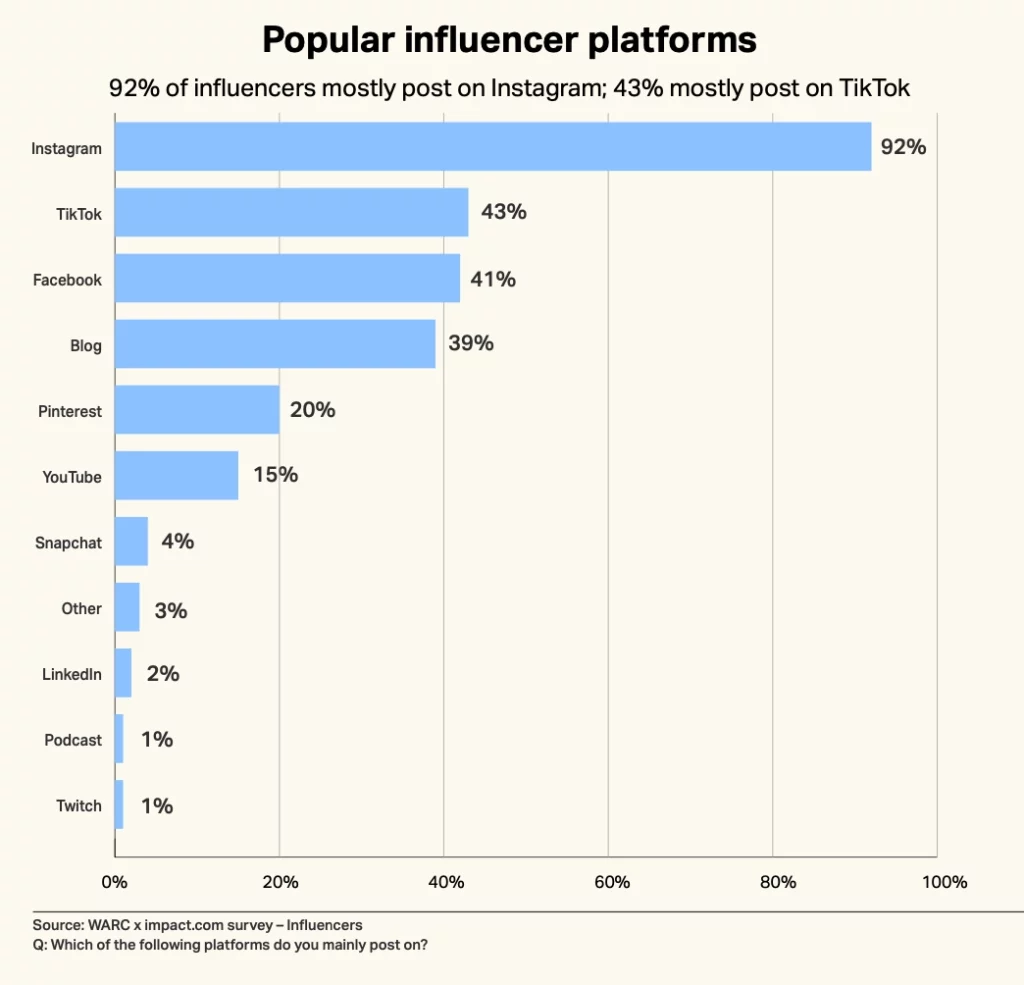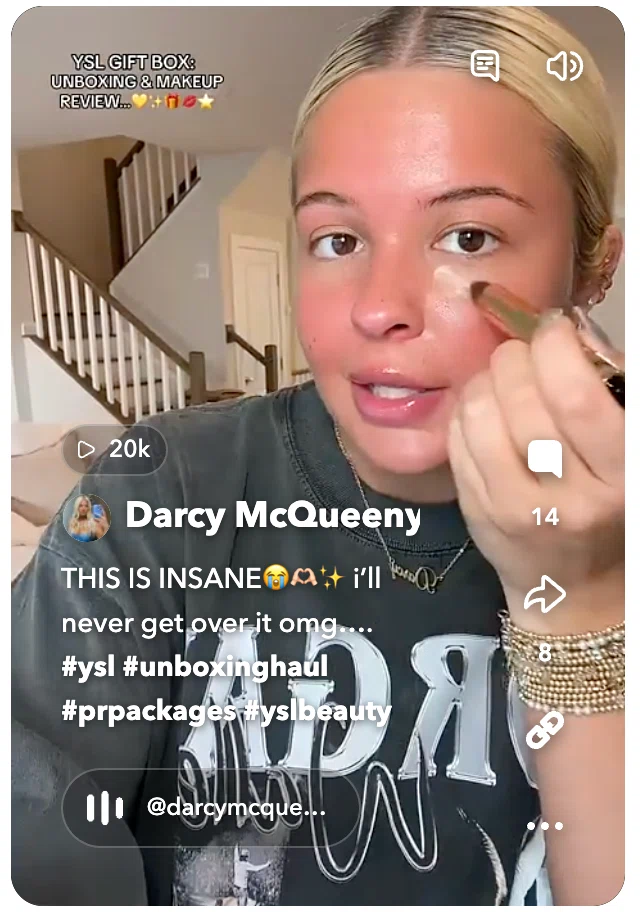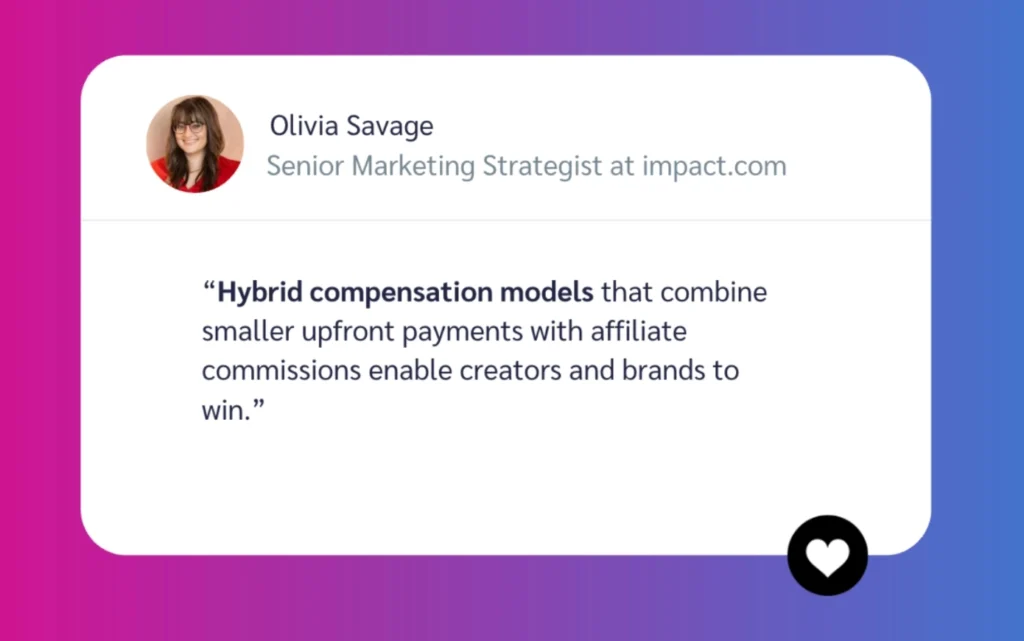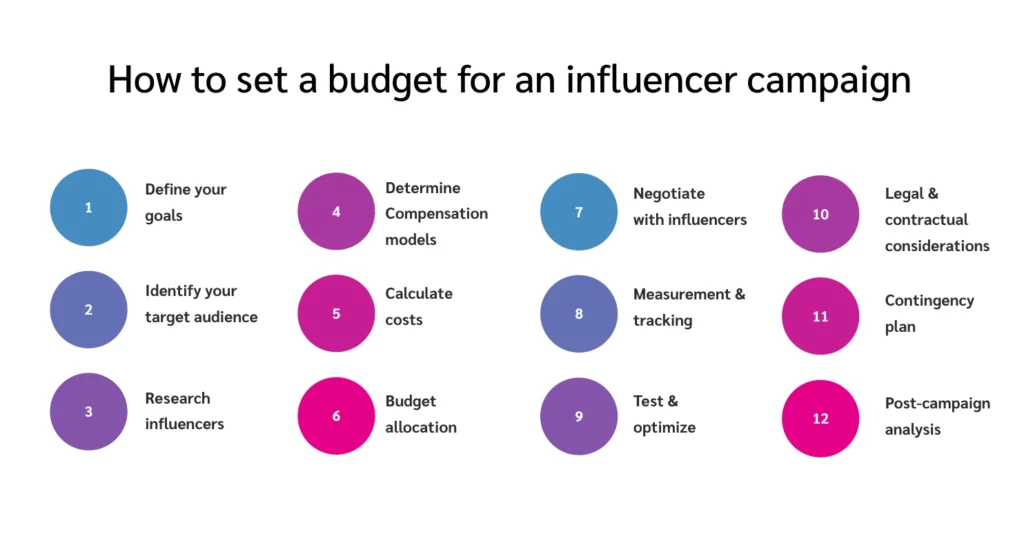By 2025, the global influencer marketing industry is projected to reach an impressive $33 billion—more than three times its size in 2020. The reason is simple: most marketers find that influencer content performs better than brand-created content. Ready to dive in? First, you need to understand the industry standards for influencer costs to budget like a pro.
Influencers work with various payment models, but according to a study by Adweek and impact.com, creators generally prefer flat fees over performance-based payments alone. The most notable finding, however, is that four out of five creators desire a combination of both payment structures—highlighting a significant trend in influencer marketing this year.
Before adding performance marketing to the mix, understanding influencer rates per post follows a straightforward path.
Before you hand over your precious marketing spend, consider these variables:
- Your audience demographic
- The type of content and influencers involved
- The media platform
- The quality of the media
- Which engagement metrics to measure
- The desired level of engagement
- Creative mandates
- Production costs and payment terms
- Timeline
- Return on investment (ROI)

Average cost based on influencer tier
Payment is often contingent on the size of a content creator’s follower count. With this in mind, influencer costs are often determined by their audience size:
- Mega-influencers or celebrities (1m+ followers): Famous beyond social media, i.e., movies, TV, music, or sports stars.
- Macro-influencers (250k–1m followers): Subject matter experts who became popular by sharing their passion for a topic on social media.
- Mid-tier influencers (75k-250k): Their reach extends to an audience size that’s middle-of-the-road compared to the other influencer tiers.
- Micro-influencers (15k-75k followers): They capture a highly engaged audience with their relatability and authenticity. Micro-influencers are the most popular tier, connecting with 46 percent of audiences.
- Nano-influencers (<15k followers): The most cost-effective tier that connects with 33 percent of audiences due to their genuine passion for niche subjects.
A bigger audience doesn’t always yield better results. According to impact.com’s research with WARC, micro-influencers have the best engagement rates even if their number of followers is smaller. Keep that in mind when you judge value based on followers.
At the end of the day, price points can only be fairly established on a case-by-case basis. It’s useful for any marketer considering using influencers to see benchmark figures. Below we’ll explore types of media and the costs associated with posts.
Average cost by social media platform
The second step to determining payment for content creators is understanding the social media platform on which they work. Payments vary by platform, as does customer interest. Influencers gravitate toward specific platforms so know which your target audience likes to use.
More often than not, content creators are most active on these social media platforms:
- Instagram: 92%
- TikTok: 43%
- Facebook: 41%
- Blog: 39%
- Pinterest: 20%
- Youtube: 15%
- Snapchat: 4%

Influencer fees generally follow a range of costs per post—although these can vary drastically depending on the influencer niche, gender, engagement rate, location, etc.
The following guidelines are the average costs per post in the United States, based on influencer rate cards gathered from impact.com’s expert influencer programs team.
Instagram posts
Instagram is the most widely leveraged social media platform. Here is the average cost per post in 2025:
| Influencer Tier | Compensation |
|---|---|
| Nano | $500 – $2,000 |
| Micro | $2,000 – $8,000 |
| Mid-tier | $8,000 – $20,000 |
| Macro | $20,000 – $45,000 |
| Mega/Celebrity | $45,000 + |

@elizabethelias promotes bowling hot spot Bowlero to her 200k+ followers—read how the brand reached 4.4m impressions here.
TikTok videos
TikTok was the most downloaded mobile video app worldwide in 2024, surpassing 825 million downloads. In video content, TikTok is becoming an increasingly popular tool for influencers seeking to go viral.
TikTok tends to have high engagement rates, which makes pricing even more cost-effective, and well below YouTube pricing for video content.
Here’s the average cost per post for TikTok videos in 2025:
| Influencer Tier | Compensation |
|---|---|
| Nano | $500 – $2,000 |
| Micro | $2000 – $8,000 |
| Mid-tier | $8,000 – $20,000 |
| Macro | $20,000 – $45,000 |
| Celebrity | $45,000 + |

Prebiotic soda brand OLIPOP reposts a TikTok featuring micro-influencer @skyelar_22. Discover how the brand used impact.com to scale their creator program and achieve 982% return on ad spend (ROAS) in this case study.
YouTube videos
YouTube pricing is higher and more fragmented than other media because video content is more time-consuming and expensive to produce than images or word-based posts.
YouTube sponsorships include integrated videos or dedicated videos. In an integrated video, your brand, product, or service features in a portion of the video. On the other hand, dedicated videos showcase your brand, product, or service in the entire video.
Here’s what the average YouTube sponsored video will cost in 2025:
| Influencer Tier | Compensation |
|---|---|
| Nano | $1,000 – $2,500 |
| Micro | $2,500 – $9,000 |
| Mid-tier | $9,000 – $25,000 |
| Macro | $25,000 – $49,000 |
| Celebrity | $49,000 + |

GetSmarter, an online learning platform, partnered with content creators to promote its courses over various platforms including YouTube, reaching 1.5m+ people. Uncover the full story here.
Facebook posts
While on the low end of the influencer marketing budget, Facebook still provides an important platform for influencers to reach followers.
Here’s what you can expect to pay for a Facebook post in 2025:
| Influencer Tier | Compensation |
|---|---|
| Nano | $500 – $1,500 |
| Micro | $1,500 – $6,000 |
| Mid-tier | $6,000 – $15,000 |
| Macro | $15,000 – $40,000 |
| Celebrity | $40,000 + |

Television presenter Holly Willoughby showcases her lifestyle brand’s fragrance through captivating imagery on Facebook.
Snapchat stories
Snapchat influencers typically charge by number of views, which is often contingent upon their follower count.
This is the average rate of Snapchat posts in 2025:
| Influencer Tier | Compensation |
|---|---|
| Nano | $200 – $1,000 |
| Micro | $1,000 – $5,000 |
| Mid-tier | $5,000 – $20,000 |
| Macro | $20,000 – $35,000 |
| Celebrity | $35,000 + |

Snapchat influencer Darcy McQueeny gives her followers an exclusive look at the latest YSL beauty products.
X posts (formerly Twitter)
X typically reaches fewer impressions than on other social media platforms, but it may be the right channel to meet your audience where they are. X rates tend to be lower, which can be cost-effective for your brand. Content from other platforms can often be syndicated to X for an even lower cost.
Here’s what influencers on X will charge per post in 2025:
| Influencer Tier | Compensation |
|---|---|
| Nano | $500 – $1,000 |
| Micro | $1,000 – $6,000 |
| Mid-tier | $6,000 – $15,000 |
| Macro | $15,000 – $30,000 |
| Celebrity | $30,000 + |

New York Jets star Jeremy Ruckert teams up with JetBlue in an exciting collaboration, surprising lucky fans with free flights to game.
How much do content creators charge for commissions?
Brands and creators are increasingly adopting hybrid compensation models that combine flat fees with sales commissions. While understanding influencer rates per post is essential, it’s equally important to determine what constitutes a fair commission for the sales they drive.
According to impact.com’s expert creator team, brands typically offer a flat fee and a 10-20 percent commission on sales across social platforms.
This balanced approach ensures creators receive immediate payment, while motivating ongoing performance, fostering a sustainable and mutually beneficial partnership. Read more about the latest trends and hybrid compensation models in 8 influencer marketing trends for 2025.

Olivia Savage breaks down hybrid compensation models in a nutshell.
How to set a budget for an influencer campaign
Setting a budget for an influencer marketing campaign requires careful consideration of multiple factors to allocate resources effectively and achieve desired outcomes. Here’s a step-by-step guide to help you set a budget for your influencer campaign:

Define your goals: Start by clarifying your campaign objectives. Are you aiming for brand awareness, engagement, lead generation, sales, or a combination of these? Your goals will shape the type of influencers you work with and the metrics you’ll track.
Identify your target audience: Understand who your target audience is and which social media platforms they frequent. This will help you determine the appropriate influencers to collaborate with.
Research influencers: Identify potential influencers who align with your brand values, niche, and target audience. Consider factors like follower count, engagement rate, content quality, and authenticity. Influencers with larger followings may charge more, but micro-influencers can offer more targeted engagement.
Determine compensation models: Decide how you’ll compensate influencers. Common payment terms include monetary payments, free products/services, affiliate commissions, or a combination. Some influencers might also accept a negotiated deal based on your specific campaign goals.
Calculate costs: Consider the various influencer marketing costs, such as influencer fees, content creation costs (if applicable), product shipping costs, and any additional fees (for example, platform fees). Also, allocate a portion of your budget for unforeseen expenses.
Budget allocation: Depending on your campaign’s scale and goals, determine how much of your overall marketing budget you will allocate to influencer marketing. Consider the potential ROI when deciding on the budget allocation.
Negotiate with influencers: Reach out to selected influencers and discuss your campaign goals, expectations, compensation, and other details. Be open to negotiation, especially if the influencer’s rates exceed your initial budget.
Measurement and tracking: Establish key performance indicators (KPIs) to measure the success of your campaign, such as engagement rates, click-through rates, conversion rates, or brand mentions. Put mechanisms in place to track these metrics.
Test and optimize: If you want better insights into your campaign’s effectiveness, consider starting with a smaller budget and testing different influencer partnerships. Use the insights gained to refine your strategy and allocate resources more effectively in the future.
Legal and contractual considerations: Have clear contracts or agreements with influencers that outline compensation, deliverables, timeline, usage rights, and any other relevant terms.
Contingency plan: Keep a portion of your budget as a contingency fund to address any unexpected changes or opportunities that may arise during the campaign.
Post-campaign analysis: After the campaign, analyze the results against your goals and KPIs. Evaluate the ROI and assess the overall effectiveness of your influencer marketing efforts.
A final word on influencer marketing costs
Remember that influencer marketing is an evolving field, and the effectiveness of your campaign can be influenced by numerous factors. Flexibility and the ability to adapt your strategy based on insights gained will be key to achieving successful outcomes.
FAQs
Influencer rates vary based on multiple key factors: platform choice (Instagram typically commanding higher fees than TikTok), follower count (from nano-influencers at $500-$2,000 to mega-influencers at $45,000+), engagement rate, content format (videos costing more than photos), industry niche, geographic location, campaign complexity (exclusivity/usage rights), and the creator’s professional reputation. According to the article, micro-influencers often provide the best engagement rates despite having fewer followers than higher-tier influencers.
Find quality influencers through specialized platforms like impact.com’s Creator Marketplace, which provides comprehensive databases with filtering options for metrics and demographics. You can also perform social media searches using built-in platform functions or use search engines to discover popular content creators in your industry. When evaluating potential partners, consider their alignment with your brand values, content quality, and audience engagement to effectively reach your target audience.
For a deeper dive into the different influencers tiers and to determine which one fits your strategy, check out the Ultimate guide to influencer tiers: from nano creators to megastars.
To get started with impact.com, request a demo or contact grow@impact.com.





